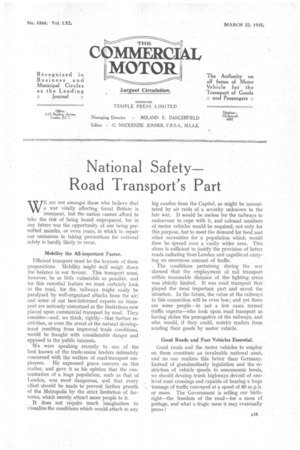National Safety —
Page 29

If you've noticed an error in this article please click here to report it so we can fix it.
Road Transport's Part
WE are not amongst those who believe that a war vitally affecting Great Britain is imminent, but the nation cannot afford to take the risk of being found unprepared, for in any future war the opportunity of our being permitted months, or even years, in which to repair our omissions in taking precautions for national safety is hardly likely to recur.
Mobility the All-important Factor.
Efficienf transport must be the keynote of these preparations. Mobility might well weigh down the balance in our favour. This transport must, however, be as little vulnerable as possible, and for this essential feature we must certainly look to the road, for the railways might easily be paralysed by well-organized attacks from the air; and some of our best-informed experts on transport are seriously concerned at the limitations now placed upon commercial transport by road. They consider—and, we think, rightly—that further restriction, or even the arrest of the natural development resulting from improved trade conditions, would be fraught with considerable danger and opposed to the public interests.
We were speaking recently to one of the best known of the trade-union leaders intimately concerned with the welfare of road-transport employees. He expressed grave concern on this matter, and gave it as his opinion that the concentration of a huge population, such as that of London, was most dangerous, and that every effort should be made to prevent further growth of the Metropolis by the strict limitation of factories, which merely attract more people to it.
It does not require much imagination to visualize the conditions which would attach to any big exodus from the Capital, as might be necessitated by air raids of a severity unknown to the late war. It would be useless for the railways to endeavour to cope with it, and colossal numbers of motor vehicles would be required, not only for this purpose, but to meet the demand for food and other necessities for a population which would then be spread over a vastly wider area. This alone is sufficient to justify the provision of better roads radiating from London and capable of carrying an enormous amount of traffic.
The conditions pertaining during the war showed that the employment of rail transport within reasonable distance of the fighting areas was strktly limited. It was road transport that played the most important part and saved the situation. In the future, the value of the railways in this connection will be even less; and yet there are some people—in not a few cases termed traffic experts—who look upon road transport as having stolen the prerogative of the railways, and who would, if they could, restrict traders from sending their goods by motor vehicle.
Good Roads and Fast Vehicles Essential.
Good roads and the motor vehicles to employ on them constitute an invaluable national asset, and no one realizes this better than Germany. Instead of grandmotherly legislation and the restriction of vehicle speeds to uneconomic levels, we should develop trunk highways devoid of onelevel road crossings and capable of bearing a huge . tonnage of traffic conveyed at a speed of 60 m.p.h. or more. The Government is selling our birthright—the freedom of the road—for a mess of pottage, and what a tragic mess it may eventually prove




























































































